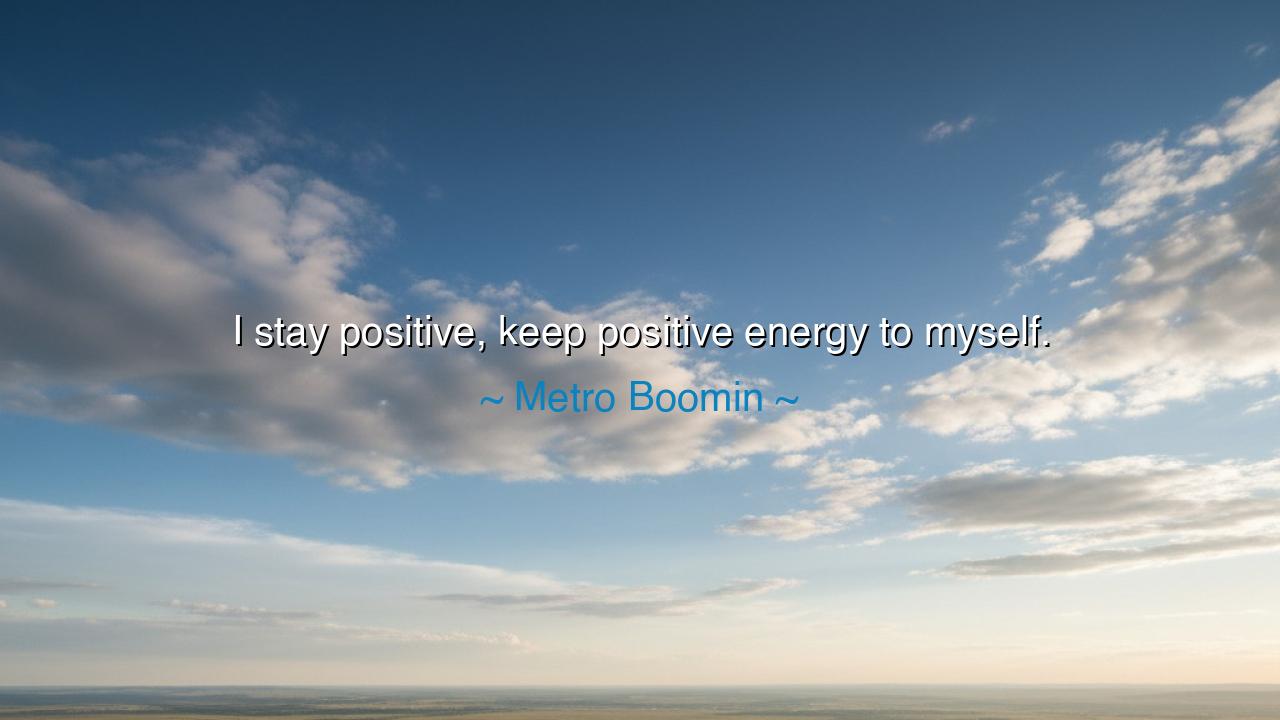
I stay positive, keep positive energy to myself.






Hear now the words of wisdom, spoken as a flame in the darkness: “I stay positive, keep positive energy to myself.” So declared Metro Boomin, a herald of rhythm in our age, but his voice echoes with the timeless counsel of the ancients. For though the world shifts and the faces of its singers change, the truth remains the same—that within a person lies a radiant light, and if one guards it well, it becomes a fortress against despair.
When he speaks of staying positive, he is not uttering a shallow encouragement, but calling upon the great discipline of the soul. The sages of old taught much the same: that a man’s heart is a vessel, and what it holds will overflow into his days. If bitterness and envy take root, then his works will wither; but if he cultivates positive energy, then even amidst storms, his spirit shall shine, and those around him will be lifted.
Consider the tale of Marcus Aurelius, emperor of Rome, who bore the weight of empire in days when enemies pressed upon every border. His journals reveal no cries of hatred nor surrender, but words of calm endurance: “You have power over your mind—not outside events.” This is the very essence of Metro Boomin’s phrase. To keep positive energy to oneself is not selfishness, but stewardship, for one cannot guide an empire, or even a single household, if one has surrendered inwardly to despair.
Yet, beware: not all who proclaim positivity live it truly. For to broadcast hollow joy is easy, but to guard the flame of positive energy when grief gnaws, when betrayal cuts, when fortune turns her face away—that is the mark of the strong. Thus, the teaching demands both vigilance and humility: vigilance, to reject the poison of negativity before it seeps too deep; humility, to admit when one must retreat, rest, and rekindle the fire within.
There are those in history who faltered by neglecting this teaching. Napoleon, whose star once blazed over Europe, let suspicion and bitterness cloud his judgment. In clinging to power, he lost sight of the inner discipline that sustains true greatness, and so his empire crumbled. His tale is a reminder: when the mind is consumed by darkness, outward conquests turn to dust.
But let us also look to the common man, for wisdom is not only in kings. A farmer, who rises each day to labor though the soil yields little, embodies this teaching when he greets the dawn with hope, saying, “Today I will do better.” His neighbors, seeing his endurance, are inspired to endure as well. Thus, one soul’s choice to keep positive energy within becomes a ripple that strengthens the community.
The lesson for us, then, is clear: guard your spirit as a sacred flame. When trials press upon you, whisper to yourself: “I stay positive.” Do not let the world snuff out your light. Practice gratitude each morning, speak words that heal rather than wound, and withdraw when you must to replenish the well of your own strength. In this way, you will not only endure, but become a beacon to others.
And so, beloved listener, remember this: life will always test you with shadow, but it is your task to carry the sun within. Metro Boomin’s words are not mere melody, but a call to arms for the soul. Take them as your shield, and let positive energy be both your guide and your gift to the world.






UGUser Google
This quote prompts me to reflect on how different people manage emotional energy. Does keeping positivity inward help prevent burnout or emotional depletion in demanding industries? Alternatively, could it create a sense of disconnection from others if not balanced with outward expression? I’d like a perspective on practical methods for maintaining internal positivity while still fostering meaningful connections and influence in personal and professional contexts.
HANguyen Hong Anh
I’m intrigued by the idea of channeling positivity inward. How does this practice affect long-term creativity and motivation? Could it be that keeping positive energy to oneself helps maintain clarity and focus, especially under pressure, or does it risk detachment from the collaborative process? Exploring strategies for effectively managing and internalizing positive energy could reveal insights for both personal well-being and professional performance.
PNPhuc Nguyen
Reading this, I wonder about the mental and emotional benefits of retaining positive energy internally. Can focusing positivity inward improve resilience and personal growth, or does it limit relational connections and influence? I’d like a perspective on whether this approach is primarily a self-care strategy, a mindset for maintaining focus, or both, and how it might impact relationships, teamwork, or public interactions in a high-profile career.
THThanh Hang
This statement makes me think about the boundaries between personal positivity and social interaction. Does keeping positive energy to oneself mean not sharing it with others, and if so, is there a risk of isolation or missed opportunities to uplift others? I’m curious how one balances maintaining personal positivity while also contributing to the energy of the people around them, especially in creative or collaborative environments like music production.